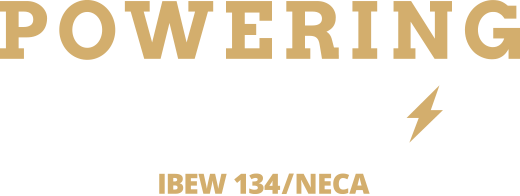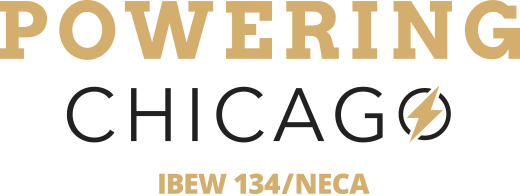National Apprenticeship Week 2021: A Conversation with Third-Year Apprentice Benjamin Akwaboah
- Posted: November 17, 2021
- National Apprenticeship Week 2021
Powering Chicago celebrates our amazing apprentices during the 7th annual National Apprenticeship Week (NAW), November 15 – 21, 2021. With over 1,500 apprentices trained at our IBEW-NECA Technical Institute, we are proud of the hard work of all our students.
NAW is a nationwide celebration where industry, labor, equity, workforce, education, and government leaders host events to showcase the successes and value of Registered Apprenticeship for rebuilding our economy, advancing racial and gender equity, and supporting underserved communities.
We know the path to IN-Tech is not always a direct one. Some apprentices heard about us from friends or family in the union or were looking for the next step after serving in the military. All are motivated by the desire to have a good job with security, learn a skill where they can succeed, and be part of a brother and sisterhood that remains for life.
As part of our celebration, we’ll be sharing our apprentices’ stories.
Here is our conversation with third-year apprentice Benjamin Akwaboah.
Why did you decide to become a union electrician?
Benjamin: I decided to go to the union mainly because I get paid more, but also, I know that the training is way better. Before I actually got in, I was going to do a non-union apprenticeship, but I didn’t really like how the training was set up and it was more difficult. With the non-union, I had to go out and find my own work. And I knew that through the apprenticeship at IBEW, you get placed somewhere and you have better job security through the union.
Tell me a little bit about your experience at IN-Tech and how it’s preparing you for a career in electrical construction.
Benjamin: It definitely increases your confidence because the training includes the same things that you’re going to go out in the field and do. We’re not going out completely blind, but we see everything in school, and then we go out and do it on a bigger scale.
If a friend was interested in the profession, what would you say are the benefits to becoming a union electrician?
Benjamin: The main thing is the pay, because that’s the main reason people work. But the focus on safety is really big in the union and is not necessarily as important in non-union. We all see when you’re driving down the street, workers working on a home and they’re not necessarily using the best practices for safety. I feel like the union puts a lot of importance on safety and job security.
How did you learn about the apprenticeship program?
Benjamin: I learned about it because we used to drive past it on the expressway. Around 2010 is when I actually started paying attention. I always wanted to be an electrician, but I never thought about coming through the apprenticeship program until then. That was the very first time I took the test. I didn’t pass, it’s always been on my mind to do it. I went to university, got a bachelor’s degree and did that for a little while, but it always came back to “I want to be an electrician”, and I finally got in.
Tell me about your experience with the Four Lenses and the DEI training.
Benjamin: I found the Four Lenses course very informative. These are things that I already think about, but not necessarily in that light. And to have the resources explained like it was with the different colors, definitely me figure out who I was. And then you realize that, this is blue, I know somebody that’s blue, and it really brings the understanding of being better able to understand others.
What’s been your biggest takeaway with the Life Mastery curriculum so far?
Benjamin: My biggest takeaway is just how important it is to treat everyone as an individual instead of treating them as a whole group. Don’t treat them all the same because every group is composed of individuals. Maybe at that moment, they had a group mentality, but they still have their individual, belief systems or hobbies.
How will it help you when you’re out in the field?
Benjamin: Everybody in the team brings a different personality, so you have to be able to interact with each individual in the best way. That’s really important. If I’m talking to someone who’s blue in the Four Lenses program, and they always want to talk about their family or they always want to talk every time I get in proximity to them, I know that’s what they need to do. I am OK to listen to that.
How will it help in your personal life?
Benjamin: I feel like it’ll impact all aspects of my life, because either way you have interpersonal skills that you have to use daily. You always have to talk to different people no matter where you go. You go to the store and interact with different people or you go to the gym or go for a walk in the park and there’s always different people to interact with and they’re all doing their own thing. You’ve got to be able to adapt to your environment positively.
How has IN-Tech prepared you to work in renewable energies like solar?
Benjamin: Again, it goes to just the quality of the school. The training is focused on everything that we would do in the field, except on a smaller scale. We went outside and built the solar panel system with the mounts, and if we went into the field we would do the exact same thing (except it would be in a large solar field). The school really prepares us to do things on a larger scale.
What is your vision for the future?
Benjamin: I don’t want to be in the field my whole career, I want to move up. I’m not sure what all the positions are, but eventually something that’s not in the field anymore. I don’t want to put that stress on my body my whole career if I don’t have to. If I can get into estimating or another position, I’ll go to school to learn. I’m willing to do that because I like learning new things anyway. It’s wherever it takes me, that’s where I go.Maybe I’ll be an instructor. I want to give back to the school, to the union that has given me so much, I can put back what I can.
National Apprenticeship Week is an opportunity to highlight how Registered Apprenticeship, a proven and industry-driven training model, provides a critical talent pipeline that can help to address some of our nation’s pressing workforce challenges such as responding to critical supply chain demands and supporting a clean energy workforce, modernizing our cybersecurity response, addressing public health issues, and rebuilding our country’s infrastructure.

